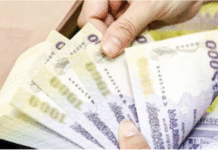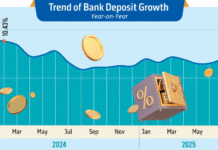

Volatility in the country’s foreign exchange market yesterday intensified further amid scarcity of the greenbacks, forcing travellers to buy a US dollar at up to Tk 102, the highest in Bangladesh, in open markets.
Importers had to pay a maximum of Tk 97 per dollar to settle their import bills, up from Tk 95-96 on Monday at many banks, even though the Bangladesh Bank injected $96 million into the market to bring back stability.
The central bank has injected a record $5.31 billion this fiscal year to ease dollar shortage faced by banks.
Although the central bank had instructed lenders to charge Tk 87.60 per dollar on importers, banks were compelled to ignore the directive in the last few days due to the falling supply of the US currency against surging demand to settle import bills.
With the market facing instability, the Bangladesh Bank depreciated the taka twice within a week.
Economists said the fall of the local currency against the dollar will help exporters and remitters, but it will fuel inflation further by increasing the cost of imported goods immediately, leading to extra burden on people already bearing the brunt of rising commodity prices.
So they suggested the government expand open market sales (OMS), provide cash assistance to the poor and strengthen the social safety-net programmes to protect the lower income groups.
The soaring import payments, now hovering around $7 billion per month amid the price hikes in the global market, are the pivotal reason for the shortage of the US dollar in the banking sector.
“There is no other scope but to devalue the taka against the dollar to subdue the high import cost. This subsequently helps reduce the trade deficit, which will keep the economy sound,” said Md Habibur Rahman, chief economist of the central bank.
The trade deficit reduced the reserves to $41.92 billion last week in contrast to $46.15 billion on December 31. The reserves had surpassed $48 billion in August.
“If the central bank devalues the taka against the dollar, you [people] have to feel the pinch from inflation. In the greater interest of the economy, the central bank is doing its job,” Habibur said.
Between July and March, import payments escalated to $61.52 billion, up 44 percent year-on-year while exports grew 33 percent to $36.61 billion. This inflicted the highest-ever trade deficit of $24.90 billion on Bangladesh during the period.
The trade deficit caused a fall in reserves to $41.92 billion last week from $46.15 billion on December 31. The reserves had surpassed $48 billion in August.
Against this backdrop, Habibur said, the government should take different measures including expanding OMS to insulate the poor households from the price increases.
Another central bank high official, on the condition of anonymity, said the BB might not devalue the inter-bank exchange rate further this week just after the latest depreciation of local currency by 0.91 percent to Tk 87.50 a dollar, the sharpest single-day fall in the past one decade.
The taka was devalued five times this year.
The exchange rate stood at Tk 85.80 a dollar on December 30 and Tk 84.80 on May 17 last year.
“We will observe the situation in the next couple of days, after which the central bank will take decision whether it will devalue the taka further,” he said.
But managing directors of three banks, wishing not to be named, said BB should decrease the inter-bank exchange rate to Tk 92 a dollar in the quickest possible time in order to restore discipline in the foreign exchange regime.
Some banks are now offering Tk 95 a dollar to hunt remittances, but the rate is supposed to be Tk 86-87 in line with the central bank instructions.
Syed Mahbubur Rahman, managing director of Mutual Trust Bank, said the BB was on the right course of direction as it was now depreciating the local currency based on the market demand.
“But more depreciation is required,” he said.
Emranul Huq, managing director of Dhaka Bank, echoed the same, saying the market is yet to be stabilised, which is why the central bank should think of weakening the local currency further.
Mustafizur Rahman, a distinguished fellow at the Centre for Policy Dialogue, said the central bank should have followed a gradual depreciation of the local currency much earlier.
“But it did not do so, as a result of which it is now compelled to depreciate the local currency drastically,” he added.
The exchange rate came under pressure against the dollar since the final quarter of 2021 when imports bounced back due to the pent-up demand and price hikes in the global market following the improvement in the coronavirus situation.
“In this context, the depreciation will help exporters and remitters, but it will further fuel inflation due to price hike of the imported items,” said Mustafizur.
Inflation in Bangladesh rose five basis points to 6.22 percent in March, driven by higher food prices, according to data from the Bangladesh Bureau of Statistics.
Mustafizur suggested the government strengthen the OMS to shield the poor from the price hike stemming from the taka devaluation.
The depreciation will encourage remitters to send their hard-earned money through formal channels as it will slash the exchange rate gap between formal and informal channel.
Many remitters are preferring hundi, an illegal cross-border transaction system, as they get a higher rate of the taka than what banks offer. This has left an adverse impact on the inflow of remittance, which is also squeezing the forex reserves.
Between January and April, remittances stood at $17.307 billion, down 16.2 percent year-on-year.
Zahid Hussain, a former lead economist of the World Bank’s Dhaka office, said the central bank should increase its repo (repurchasing agreement) rate to rein in inflation.
Although money supply to the market has decreased, slashing the repo rate will create a psychological barrier among businesses to hike the products.
The repo rate is the rate at which the central bank lends money to banks in the event of any shortfall of funds. The BB also uses the means to reduce the money supply in the market to check inflation.
He suggested the government provide cash assistance to the poor in the wake of inflation.
Selim Raihan, executive director of the South Asian Network on Economic Modeling, says more devaluation of the taka is needed but the government also should lay emphasis on tackling inflation.
It takes time to reap benefits from weakening of the taka, but the inflationary pressure hits the commoners immediately, he said.
The coverage of social safety nets should be widened in the next fiscal budget to help the poor, Selim said.









